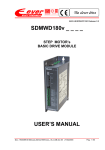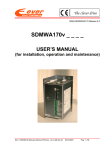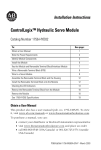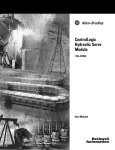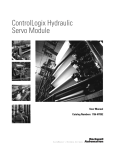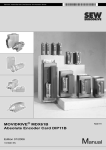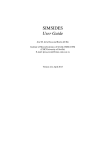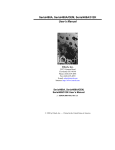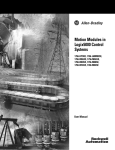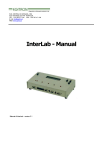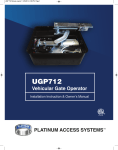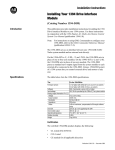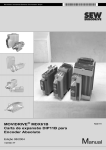Download 4100-5.2, AEC Absolute Encoder Converter, Installation and Setup
Transcript
AEC Absolute Encoder Converter (Cat. No. 4100-5.2) Installation and Setup Manual Important User Information Because of the variety of uses for the products described in this publication, those responsible for the application and use of this control equipment must satisfy themselves that all necessary steps have been taken to assure that each application and use meets all performance and safety requirements, including any applicable laws, regulations, codes and standards. The illustrations, charts, sample programs and layout examples shown in this guide are intended solely for purposes of example. Since there are many variables and requirements associated with any particular installation, Allen-Bradley does not assume responsibility or liability (to include intellectual property liability) for actual use based upon the examples shown in this publication. Allen-Bradley publication SGI-1.1, Safety Guidelines for the Application, Installation and Maintenance of Solid-State Control (available from your local Allen-Bradley office), describes some important differences between solid-state equipment and electromechanical devices that should be taken into consideration when applying products such as those described in this publication. Reproduction of the contents of this copyrighted publication, in whole or part, without written permission of Rockwell Automation, is prohibited. Throughout this manual we use notes to make you aware of safety considerations: ATTENTION ! Identifies information about practices or circumstances that can lead to personal injury or death, property damage or economic loss Attention statements help you to: • identify a hazard • avoid a hazard • recognize the consequences IMPORTANT Identifies information that is critical for successful application and understanding of the product. Allen-Bradley is a trademark of Rockwell Automation European Communities (EC) Directive Compliance If this product has the CE mark it is approved for installation within the European Union and EEA regions. It has been designed and tested to meet the following directives. EMC Directive This product is tested to meet the Council Directive 89/336/EC Electromagnetic Compatibility (EMC) by applying the following standards, in whole or in part, documented in a technical construction file: • EN 50081-2 EMC — Generic Emission Standard, Part 2 — Industrial Environment • EN 50082-2 EMC — Generic Immunity Standard, Part 2 — Industrial Environment This product is intended for use in an industrial environment. Low Voltage Directive This product is tested to meet Council Directive 73/23/EEC Low Voltage, by applying the safety requirements of EN 61131-2 Programmable Controllers, Part 2 - Equipment Requirements and Tests. For specific information required by EN 61131-2, see the appropriate sections in this publication, as well as the Allen-Bradley publication Industrial Automation Wiring and Grounding Guidelines For Noise Immunity, publication 1770-4.1. This equipment is classified as open equipment and must be mounted in an enclosure during operation to provide safety protection. Table of Contents Preface Read This Manual Read This Manual . . . . . . . . . . . . . . . . . . . . . . . . . Who Should Use this Manual. . . . . . . . . . . . . . . . . Purpose of this Manual . . . . . . . . . . . . . . . . . . . . . Safety Precautions . . . . . . . . . . . . . . . . . . . . . . . . . Contents of this Manual . . . . . . . . . . . . . . . . . . Related Documentation . . . . . . . . . . . . . . . . . . Terminology . . . . . . . . . . . . . . . . . . . . . . . . . . . . . Common Techniques Used in this Manual . . . . . . . AEC Product Receiving and Storage Responsibility . Allen-Bradley Support . . . . . . . . . . . . . . . . . . . . . . Local Product Support . . . . . . . . . . . . . . . . . . . Technical Product Assistance . . . . . . . . . . . . . . On the Web . . . . . . . . . . . . . . . . . . . . . . . . . . . . . Chapter 1 . . . . . . . . . . . . . . . . . . . . . . . . . . . . . . . . . . . . . . . . . . . . . . . . . . . . . . . . . . . . . . . . . .. .. .. .. .. .. .. .. .. .. .. .. .. . . . . . . . . . . . . . 1 1 1 2 3 4 4 5 5 6 6 6 6 Overview AEC Description . . . . . . . . . . . . . . . . . . . . . . . . . . . . . . . . . . 7 AEC Features . . . . . . . . . . . . . . . . . . . . . . . . . . . . . . . . . . . . 8 AEC Mechanical Specifications. . . . . . . . . . . . . . . . . . . . . . . . 8 Chapter 2 Installation & Hook-Up Chapter Objectives . . . . . . . . . . . . . . . . . . . . . . . . . . . . . . . Installing the AEC . . . . . . . . . . . . . . . . . . . . . . . . . . . . . . . . Complying with European Union Directives . . . . . . . . . . . . . EMC Directive . . . . . . . . . . . . . . . . . . . . . . . . . . . . . . . . Mounting the AEC. . . . . . . . . . . . . . . . . . . . . . . . . . . . . . . . Connecting the AEC . . . . . . . . . . . . . . . . . . . . . . . . . . . . . . Connecting the AEC to the 1394 . . . . . . . . . . . . . . . . . . . Connecting the AEC to the Compact . . . . . . . . . . . . . . . . Connecting the AEC to the 1756-MO2AE. . . . . . . . . . . . . Wiring the AEC . . . . . . . . . . . . . . . . . . . . . . . . . . . . . . . . . . Wiring Cable Flying Leads to the Plugs . . . . . . . . . . . . . . The SSI Connector . . . . . . . . . . . . . . . . . . . . . . . . . . . . . The Control Connector. . . . . . . . . . . . . . . . . . . . . . . . . . Fault Relay . . . . . . . . . . . . . . . . . . . . . . . . . . . . . . . . . . . . . . . . . . . Analog Servo Command Pass Through (For Compact Only) . . . . i 11 11 11 12 12 15 16 17 19 21 21 22 24 24 26 Publication 4100-5.2 - March 2000 ii Power Supply Connector . . . . . . . . . . . . . . . . . . . . . . . . 27 Chapter 3 Setup Chapter Objectives . . . . . . . . . . . . . . . . . . . . . . . . . . . . . . . Setting the Rotary Switches . . . . . . . . . . . . . . . . . . . . . . . . . Configuration Switch Tables . . . . . . . . . . . . . . . . . . . . . . . . Configuration Switch A . . . . . . . . . . . . . . . . . . . . . . . . . Configuration Switch B . . . . . . . . . . . . . . . . . . . . . . . . . Powering the AEC. . . . . . . . . . . . . . . . . . . . . . . . . . . . . . . . AEC With GML Commander . . . . . . . . . . . . . . . . . . . . . . . . Adding AEC to your Commander Diagram . . . . . . . . . . . Setting the Transducer Resolution . . . . . . . . . . . . . . . . . . . . . . . . . Selecting Homing Procedure . . . . . . . . . . . . . . . . . . . . . . . . . . . . . Aligning Absolute Encoder . . . . . . . . . . . . . . . . . . . . . . . . . . . . . . Chapter 4 Operation Chapter Objectives . . . . . . . Absolute Position Update . . Incremental Position Output Position at Start-up . . . . . . . Chapter 5 . . . . . . . . . . . . . . . . . . . . . . . . . . . . . . . . . . . . . . . . . . . . . . . . . . . . . . . . . . . . . . . . . . . . . . . . . . . . . . . . . . . . . . . . . . . . . . . . 35 35 35 36 . . . . . . . . . . . . . . . . . . . . . . . . . . . . . . . . . . . . . . . . . . . . . . . . . . . . . . . . . . . . . . . . . . . . . . . . . . . . . . . . . . . . . . . . . . . . . . . .. .. .. .. .. 37 38 38 39 39 Fault Indication & Control Status Chapter Objectives . . Transducer Faults. Encoder Faults . . . Internal Faults . . . No Faults. . . . . . . Appendix A 29 29 30 30 31 32 32 32 33 33 34 . . . . . . . . . . . . . . . . . . . . . . . . . . . . . . . . . . . . . . . . Specifications Equivalent Circuit Diagrams. . . . . . . . . . . . . . . . . . . . . . . . . 44 Publication 4100-5.2 - March 2000 iii Appendix B Strobe Position For Applications Not Using the 1394 or Compact Absolute Strobe Cycle . . . . . . . . . . . . . . . . . . . . . . . . . . . . . 47 Absolute Strobe Timing . . . . . . . . . . . . . . . . . . . . . . . . . . . . 48 Incremental Strobe Period . . . . . . . . . . . . . . . . . . . . . . . . . . 49 Index Publication 4100-5.2 - March 2000 iv Publication 4100-5.2 - March 2000 Preface Read This Manual Read and understand this instruction manual. It provides the necessary information to let you install, connect, and set up the AEC for safe, reliable operation. This preface covers the following topics: • • • • • Who Should Use this Manual Who should use this manual The purpose of this manual Terms Common techniques used in this manual Allen-Bradley support You should read this manual if you are responsible for the installation, set up or operation of the AEC (Absolute Encoder Converter). If you do not have a basic understanding of the products listed below, contact your local Allen-Bradley representative for information on available training courses before using this product. • S Class Compact motion controller • 1394 GMC System module • GML (Graphic Motion Language) Commander software Purpose of this Manual 1 This manual is an installation and set up guide for the AEC and describes the procedures necessary to properly install and configure it into your motion control system. Publication 4100-5.2 - March 2000 Preface 2 Safety Precautions The following general precautions apply to the AEC: ATTENTION ! Electric shock can kill. Make sure the AEC is safely installed in accordance with the Installation and Set-up chapters of this manual. Avoid contact with electrical wires and cabling while power is on. Only trained service personnel should open the electrical cabinet. This product contains stored energy devices. To avoid hazard of electrical shock, verify that all voltage on the capacitors has been discharged before attempting to service, repair, or remove this unit. You should only attempt the procedures in this manual if you are qualified to do so and familiar with solid-state control equipment and the safety procedures in publication NFPA 70E and BS-EN60204. The system integrator is responsible for local safety and electrical codes. ATTENTION ! Electric shock can kill. Make sure the AEC is safely installed in accordance with the Installation and Set-up chapters of this manual. Avoid contact with electrical wires and cabling while power is on. Only trained service personnel should open the electrical cabinet. This product contains stored energy devices. To avoid hazard of electrical shock, verify that all voltage on the capacitors has been discharged before attempting to service, repair, or remove this unit. You should only attempt the procedures in this manual if you are qualified to do so and familiar with solid-state control equipment and the safety procedures in publication NFPA 70E and BS-EN60204. The system integrator is responsible for local safety and electrical codes. Publication 4100-5.2 - March 2000 Preface ATTENTION ! 3 An incorrectly applied or installed product can result in component damage or a reduction in product life. Wiring or application errors, such as undersizing or inadequate DC supply, or excessive ambient temperatures can result in a malfunction. The AEC contains ESD (Electrostatic Discharge) sensitive parts and assemblies. Static control precautions are required when installing, testing, servicing, or repairing this assembly. Component damage can result if ESD control procedures are not followed. If you are not familiar with static control procedures, refer to Allen-Bradley publication 8000-4.5.2, Guarding Against Electrostatic Damage or any other applicable ESD Protection Handbook. Contents of this Manual Chapter Title Preface 1 Overview 2 Installation 3 Set-Up 4 Operation 5 Fault Indication & Control Status Specifications Appendix A Appendix B Strobe Position Contents Describes the purpose, background, and scope of this manual. Also specifies the audience for whom this manual is intended. Provides a general description of the AEC, its features and mechanical specifications. Provides the steps needed to successfully mount and wire the AEC to an SSI device and the S Class Compact Motion Controller or the 1394 GMC system. Provides the guidelines for setting up and configuring the AEC. Provides information on Absolute and Incremental Position.. Provides information on fault and status indicators and types of faults. Provides physical, electrical, environmental, and functional specifications for the AEC. Contains additional information about setting the strobe for those users connecting their AEC to a controller other than the S Class Compact Motion Controller or the 1394 GMC system. Publication 4100-5.2 - March 2000 Preface 4 Related Documentation The following documents contain additional information concerning related Allen-Bradley products. To obtain a copy, contact your local Allen-Bradley office or distributor. For Programming Allen-Bradley motion controller with GML Read This Document GML Commander User Manual v4.01 GML Commander Reference Manual v4.01 Document Number GMLC-5.1 GMLC-5.2 Instructions for installation and set-up for the 1394 GMC system 1394 Digital, AC, Multi-Axis Motion Control System User Manual 1394-5.0 Instructions for installation and set-up for the S Class Compact motion controller IMC S Class Compact Motion Controller Installation and Set-up Manual 999-122 An article on wire sizes and types for grounding electrical equipment (North American standards) National Electrical Code Published by the National Fire Protection Association of Boston, MA. An article on wire sizes and types for grounding electrical equipment (European standards). BS-EN 60204 Electrical Equipment of Machines Published by British Standards Institute A complete listing of current Allen-Bradley documentation, including ordering instructions. Also indicates whether the documents are available on CD-ROM or in multi-languages Allen-Bradley Publication Index SD499 A glossary of industrial automation terms and abbreviations Allen-Bradley Industrial Automation Glossary AG-7.1 Terminology In order to avoid confusion, we have used the following general terms in a specific manner within this manual. We define them as follows: Transducer - the SSI device is considered a transducer for the purposes of this manual. Encoder - Refers to the AEC connector that goes to the 1394 GMC System or the S Class Compact motion controller. The cable from the controller attaches to the AEC at the Encoder connector. For specific definitions of other terms used in industrial automation, see the Allen-Bradley Industrial Automation Glossary (publication number AG-7.1). Publication 4100-5.2 - March 2000 Preface Common Techniques Used in this Manual The following conventions are used throughout this manual: • Bulleted lists such as this one provide information, not procedural steps. • Numbered lists provide sequential steps or hierarchical information. • Words that you type or select appear in bold. • When we refer you to another location, the section name appears in italics. ATTENTION ! IMPORTANT AEC Product Receiving and Storage Responsibility 5 The exclamation point inside of a triangle, followed by the word “ATTENTION” indicate circumstances that can lead to personal injury, death, property damage or economic loss. Identifies information that is critical for successful application and understanding of the product. You, the customer, are responsible for thoroughly inspecting the equipment before accepting the shipment from the freight company. Check the item(s) you receive against your purchase order. If any items are obviously damaged, it is your responsibility to refuse delivery until the freight agent has noted the damage on the freight bill. Should you discover any concealed damage during unpacking, you are responsible for notifying the freight agent. Leave the shipping container intact and request that the freight agent make a visual inspection of the equipment. Leave the product in its shipping container prior to installation. If you are not going to use the equipment for a period of time, store it: • • • • in a clean, dry location within an ambient temperature range of 0 to 85° C (32 to 185° F) within a relative humidity range of 5% to 95%, non-condensing in an area where it cannot be exposed to a corrosive atmosphere • in a non-construction area Publication 4100-5.2 - March 2000 Preface 6 Allen-Bradley Support Allen-Bradley offers support services worldwide, with over 75 Sales/ Support Offices, 512 authorized Distributors and 260 authorized Systems Integrators located throughout the United States alone, plus Allen-Bradley representatives in every major country in the world. Local Product Support Contact your local Allen-Bradley representative for: • • • • sales and order support product technical training warranty support support service agreements Technical Product Assistance If you need to contact Allen-Bradley for technical assistance, please review the information in this manual first. Then call your local Allen-Bradley representative. For the quickest possible response, we recommend that you have the catalog numbers of your products available when you call. See the Related Documentation section of this chapter for the publication numbers of other manuals that can help with this product. The Rockwell Automation Technical Support number is: 1-603-443-5419 On the Web For information about Allen-Bradley, visit the following World Wide Web site: http://www.ab.com/ Publication 4100-5.2 - March 2000 Chapter 1 Overview AEC Description The AEC is an absolute encoder converter. It receives the absolute position sent by the SSI transducer and changes it to an incremental quadrature signal that the 1394 GMC System module and the S Class Compact motion controller can use. The AEC is designed to accept outputs from absolute encoders, linear displacement transducers, or any other measuring device, which transmits its measured values over an SSI. Several devices are supported with various combinations of counts per turn and number of turns. These are defined in the Setup chapter of this manual. Parallel output devices are not supported. The AEC provides two independent channels from absolute to incremental quadrature conversion. The resolution of each channel is set via rotary switches and each one can operate with a transducer using a different supply voltage. (Although the supply voltages may be different, they are not isolated. The grounds must be of equal potential.) Each channel can be individually strobed to obtain new absolute or incremental position information. 7 Publication 4100-5.2 - March 2000 8 Overview AEC Features The AEC has the following features: • Two fully independent axes capable of absolute to incremental quadrature conversion. • Each channel can support independent absolute transducer input. • User selectable resolution. • Fixed transducer acquisition speed of 400 kHz. • Each axis provides one differential quadrature output. • Fixed quadrature output frequency of 800 kHz. • Independent +5 V DC, + 15 V DC, and +24 V DC transducer voltages. • Selectable for incremental strobes or internal 1ms timebase. • Interfaces directly to Allen-Bradley 1394 GMC System and S Class Compact motion controllers. • Normally open and normally closed status outputs for each axis. • Bicolor LED status indication for each axis. • An on-board reset switch that resets both axes. • Absolute Home request remotely clears corrected faults and resets system on a per axis basis. • Single 18-36 V DC input voltage power requirement. • A rugged steel case for greater protection. The case has pre-drilled mounting tabs. AEC Mechanical Specifications Publication 4100-5.2 - March 2000 The following figure shows the placement and labeling of major items on the AEC front panel. Overview 9 Figure 1 AEC front panel 203.2 mm (8.0 in.) with cable clearance Use 1/4 -20 or M6 bolt (typical 2 places) Reset Axis 0 Axis 1 A B A Control Switches Encoder Configuration 4 3 2 1 5 4 3 2 1 8 7 6 5 10 9 8 7 6 342.9 mm (13.5 in.) 2 1 Switches B Configuration Encoder Power Axis 0 A Axis 1 330.2 mm (13.0 in.) 5 Control 5 4 3 2 1 4 3 2 1 10 9 8 7 6 8 7 6 SSI B SSI A B AEC 44.45 mm (1.75 in.) Package size mm and (in.) Product weight kg and (lbs.) Material 152.4 mm (6.0 in.) Package Specifications 342.9 x 152.4 x 44.45 (13.5 x 6.0 x 1.75) 2.27 (5.0) Painted Steel Publication 4100-5.2 - March 2000 10 Overview Publication 4100-5.2 - March 2000 Chapter 2 Installation & Hook-Up Chapter Objectives Read this entire chapter before beginning to mount, connect, or wire any of the components to the AEC. It is the responsibility of the installer to see that the installation conforms to the directions in this manual and local codes and procedures. This chapter covers the following topics. • • • • • • • • • European Union Compliance Mounting the AEC. Connecting the AEC to the 1394 GMC system. Connecting the AEC to the Compact motion controller. Connecting the AEC to the 1746-MO2AE. Wiring the SSI transducer to the AEC. Wiring the Control connector. An example of a Fault relay. Wiring the Power connector. Installing the AEC The AEC is designed to mount in an electrical cabinet using the flanges on its back panel. This installation method should be observed for all applications. Before powering the AEC, make sure it has been configured correctly and that the transducer(s) and control devices (controller) are connected to it correctly. Complying with European Union Directives The information contained in this document pertains to the Absolute Encoder Converter (AEC), an Allen-Bradley product. If the AEC is installed within the European Union or EEA regions and has the CE mark, the following regulations apply. 11 Publication 4100-5.2 - March 2000 12 Installation & Hook-Up EMC Directive The AEC is tested to meet Council Directive 89/336 Electromagnetic Compatibility (EMC) in accordance with Article 10 (1). The following directives apply: • EN 50081-2 EMC-Generic Emission Standard, Part 2-Industrial Environment. • EN 50082-2 EMC-Generic Immunity Standard, Part 2-Industrial Environment. The AEC, as described in this document, is intended for use in an industrial environment and is not intended for use in a residential, commercial, or light industrial environment. To meet CE requirements, the following are required: • The AEC must be mounted in an IP 54 rated metal enclosure on a metal panel. • All equipment must be bonded. • You must use the specified Allen-Bradley cables. • The AEC is designed to function without maintenance when operated in the environment specified in this manual. • Under normal conditions, the AEC should not require any periodic maintenance. However, if conditions are less than ideal and any superficial dust has accumulated on the controller over time, remove the dust carefully. Also, it is recommended to periodically inspect all cables for abrasion and all connectors for proper seating. Mounting the AEC Before mounting the AEC, verify that the 1394 GMC System or the S Class Compact motion controller is installed correctly. Refer to the 1394 Digital AC Multi-Axis Motion Control System User Manual (publication 1395-5.0) or the IMC 23/x Installation and Set-up Manual (publication 999-122) for installation instructions. The AEC must be properly grounded to the metal enclosure panel. the following diagram shows how to ground the AEC to the panel. Publication 4100-5.2 - March 2000 Installation & Hook-Up 13 Figure 2 Mounting and Grounding Diagram #10 AWG to Ground Bus AEC Mounting Tab Ground Lug Internal Star Washers Size 1/4 - 20 or M6 Hardware Tapped Hole (Minimum of 3 Threads) Scrape paint off panel to insure electrical connection between chassis and grounded metal plate. Metal Panel (Must be connected to earth ground.) Mount the AEC next to a 1394 GMC system or an S Class Compact motion controller on a metal enclosure panel using two 1/4 -20 or M6 bolts. Refer to the Mechanical Specifications in the Overview chapter of this manual for mounting dimensions. Figures 2.2 and 2.3 in this chapter show where to mount the AEC. ATTENTION ! To avoid a shock hazard, remove all power to the system panel before mounting the AEC. The 1394 contains stored energy devices. To avoid the hazard of electrical shock, verify that all voltages are zero (0.00) before proceeding. Publication 4100-5.2 - March 2000 14 Installation & Hook-Up Figure 3 Mounting the AEC next to a 1394 GMC on a system panel Wireway AEC 1394 GMC System Reset Axis 0 Axis 1 2 1 Axis 1 A B 4 3 2 1 5 4 3 2 1 8 7 6 5 10 9 8 7 6 A Control Switches Encoder Configuration B Switches A Configuration Encoder Power Axis 0 5 Optional Second AEC for Axis 2 and Axis 3 Control 5 4 3 2 1 4 3 2 1 10 9 8 7 6 8 7 6 SSI B SSI A B AEC IMPORTANT Publication 4100-5.2 - March 2000 The AEC can only be mounted on the left side (when looking directly at the mounted 1394) of the 1394 GMC System. This is due to cable specifications and module expansion of the 1394. Installation & Hook-Up 15 Figure 4 Mounting the AEC next to an S Class Compact motion controller. S Class Compact Allen –Bradley Wireway AEC IMC S Class Reset Axis 0 Axis 1 2 1 Axis 1 A B 4 3 2 1 5 4 3 2 1 8 7 6 5 Axis 0 Axis 1 Servo & Servo & Feedback Feedback IMPORTANT Connecting the AEC 10 9 8 7 6 A Control Switches B Encoder Configuration A Optional Second AEC for Axis 2 and Axis 3 Switches Axis 0 5 Configuration Encoder Power The AEC can also be placed to the left of the Compact Control 5 4 3 2 1 4 3 2 1 SSI B 10 9 8 7 6 8 7 6 SSI A B AEC The AEC can be mounted on either side of the S Class Compact motion controller on the system panel. The following section details how to connect the AEC encoder connectors to the 1394 GMC System and the S Class Compact motion controller. ATTENTION ! Do not attempt to make any electrical connections to the AEC while power is applied. Doing so risks damage to the AEC, peripheral equipment, and your health and safety. Publication 4100-5.2 - March 2000 16 Installation & Hook-Up ATTENTION ! The AEC does not support the removal or the insertion of any connectors when under power. The power disturbance can result in unintended machine motion, loss of process control, or an electrical arc that can cause an explosion in a hazardous environment. Connecting the AEC to the 1394 Connect the AEC to a 1394 GMC System using the encoder cable (catalog number 1394-GR04) for each axis. This is a four foot cable that connects Axis 0 Encoder or Axis 1 Encoder connector on the AEC to the J3, J4, J5, or J10 encoder feedback connector on the 1394. IMPORTANT This cable is polarity sensitive. IMPORTANT The AEC does not require power from the 1394 to operate nor does it provide power to the 1394. However, the 1394 requires a separate 5V power supply to run its interface circuitry. The 1394 interface circuitry requires 0.325A to operate. Any additional devices connected to the 1394, such as incremental encoders, can require an additional 0.2A per device (check your device for the precise requirements). To connect the encoder cables: 1. Insert the 12-pin plug labeled “REC/AEC” in the Axis 0 Encoder or Axis 1 Encoder connector on the AEC. 2. Insert the 12-pin plug labeled “1394” in the J3, J4, J5, or J10 encoder feedback connector on the 1394. 3. Wire the remaining auxiliary power labeled “ENC. PWR” to the 5V DC power supply. The red wire is +5V and the black is a +5 common. Publication 4100-5.2 - March 2000 Installation & Hook-Up 17 IMPORTANT When using multiple Encoder devices, we recommend you wire all of the auxiliary power cables to the same 5V DC power supply. Figure 5 Connecting the Encoder Cables and the 5V Power Supply to the 1394 Wireway 1394 GMC System AEC Reset Axis 0 Axis 1 2 1 Axis 1 Encoder Connector A Axis 1 5V DC Power Supply B 4 3 2 1 5 4 3 2 1 8 7 6 5 10 9 8 7 6 A Control Switches Encoder Configuration B Axis 0 Encoder Connector 1394-GR04 Switches A Configuration Encoder Power Axis 0 5 Control 5 4 3 2 1 4 3 2 1 SSI B 10 9 8 7 6 8 7 6 SSI A B AEC IMPORTANT Anchor the cable so that no more than 2 feet of cable is left unsupported. The excessive weight of an unanchored cable could pull the plug out of the connector Connecting the AEC to the Compact To connect the AEC to the S Class Compact motion controller, use the encoder cable (catalog number 4100-RCS3T) for each axis. This three foot cable connects the Axis 0 Encoder or the Axis 1 Encoder connector on the AEC to the Axis 0, 1, 2, or 3 servo and feedback connector on the Compact. The Compact sends the drive servo output Publication 4100-5.2 - March 2000 18 Installation & Hook-Up signal through the 4100-RCS3T cable. The following figure shows where to connect the encoder cable to the AEC and the Compact. IMPORTANT This cable is NOT polarity sensitive. To connect the Encoder cable: 1. Insert one 12-pin plug in the Axis 0 Encoder or Axis 1 Encoder connector on the AEC. 2. Insert the remaining 12-pin plug in the Axis 0, 1, 2, or 3 servo and feedback connector on the Compact. Figure 6 Connecting the Encoder Cables to the Compact S-Class Compact Allen –Bradley Wireway AEC IMC S Class Reset Axis 0 Axis 1 2 1 Axis 1 A B 4 3 2 1 5 4 3 2 1 8 7 6 5 Axis 0 Axis 2 Axis 1 Axis 3 Servo & Servo & Servo & Servo & Feedback Feedback Feedback Feedback IMPORTANT Publication 4100-5.2 - March 2000 10 9 8 7 6 A Control Switches B Encoder Configuration A Configuration Encoder Power Axis 0 5 Switches 5 4 3 2 1 4 3 2 1 Control 4100-RCS3T SSI B 10 9 8 7 6 8 7 6 SSI A B AEC Anchor the cable so that no more than 2 feet of cable is left unsupported. The excessive weight of an unanchored cable could pull the plug out of the connector. Installation & Hook-Up 19 Connecting the AEC to the 1756-MO2AE See Application Note, publication number 4100-2.7 for more detailed information regarding using the AEC with the 1756-MO2AE. TIP To connect the AEC to the 1756-MO2AE, use the pre-made encoder cable (4100-CCS15F) for each axis. This 15 foot cable connects the Axis 0 Encoder or Axis 1 Encoder connector on the AEC to the 1756-MO2AE. The 4100-CCS15F is a 15 foot cable with a 12-pin plug on one end and the flying leads on the other end. IMPORTANT This cable is NOT polarity sensitive. To connect the 4100-CCS15F Encoder cable: 1. Insert the end with the 12-pin plug to either the Axis 0 Encoder or Axis 1 Encoder connector on the AEC. 2. Connect the flying leads to the appropriate pin locations on the 1756-MO2AE using the pin locations as shown in the following diagram. 1756-MO2AE Pins for Connecting AEC Pin Number Pin Value Wire Color 1 V REF+ Red 3 V REF- Black 11 Chassis Black 25 A+ White 27 A- Black 29 B+ Green 31 B- Black 33 Z+ Blue 35 Z- Black Publication 4100-5.2 - March 2000 20 Installation & Hook-Up The wires for Strobe+ and Strobe- must be run through the DC Output card. The pin locations are designated in the following table. DC Output 1756-OB16I/A Pins for Connecting the AEC Strobe Pin Number Pin Value Wire Color 2 Strobe + Yellow 1 Strobe - Black The following diagram shows the 4100-CCS15F cable connecting the AEC to the 1756-MO2AE. Figure 7 Connecting the Encoder Cable to the 1756-MO2AE and DC Output 1756-MO2AE 2 AEC 1 +OUT-0 +OUT-1 4 3 6 5 8 7 10 9 12 11 14 13 -OUT-1 -OUT-0 +ENABLE-0 +ENABLE-1 -ENABLE-0 Reset -ENABLE-1 DRVFLT-0 DRVFLT-1 CHASSIS Axis 0 Axis 1 CHASSIS 24 23 REG24V-1 REG5V-1 +OK 4100-CCS15F 5 CHASSIS Axis 0 -OK CHASSIS 26 25 28 27 +CHA-1 +CHA-0 -CHA-0 A B -CHA-1 30 29 +CHB-0 +CHB-1 32 31 34 33 36 35 -CHB-0 -CHB-1 +CHZ-1 +CHZ-0 -CHZ-0 2 1 -CHZ-1 Axis 0 Encoder Connector 2 1 4 3 6 5 8 7 10 9 12 11 14 13 16 15 18 17 20 19 22 21 24 23 26 25 28 27 30 29 32 31 34 33 36 35 Publication 4100-5.2 - March 2000 A Axis 1 DC Output B 4 3 2 1 5 4 3 2 1 8 7 6 5 10 9 8 7 6 A SSI 21 REG5V-0 Control 19 22 REG24V-0 5 4 3 2 1 4 3 2 1 Switches 20 HOME-1 Encoder Configuration 17 Switches 15 18 Configuration Encoder Power 16 HOME-0 B 10 9 8 7 6 8 7 6 Control A IN_COM SSI IN_COM B AEC Installation & Hook-Up 21 Wiring the AEC There are several connectors on the front of the AEC. All are duplicated for each axis except the power input connector. Each axis has two five-pin plugs for connecting the SSI transducer and two four-pin plugs for connecting a control. In the center is a 2-pin plug for the power cable. The flying leads wire directly to the screw terminals on the plugs. Wiring Cable Flying Leads to the Plugs To wire the cable leads to the plug: 1. Look at the plug to make sure the terminal is open. The following figure shows both an open and a closed terminal. Figure 8 Terminal diagram Terminal open Clamping screws Terminal closed 2. Terminal Steps If the terminals are: Do this: Not open Go to step 3 Open Go to step 4 3. Using a small, flat-head screwdriver, turn the clamping screw counter-clockwise several times. 4. Using a proper stripping tool, strip the wire insulation back on the cable lead. IMPORTANT accommodate a maximum of 14 gauge wire. 5. Trim the cable lead so that 0.275 inches of metal wire is exposed. 6. Insert the cable lead in the appropriate terminal. Refer to the proper figures for their locations. Publication 4100-5.2 - March 2000 22 Installation & Hook-Up 7. Use the screwdriver to tighten the clamping screw to the proper torque (0.25 N-m/2.2 in-lb.). 8. Verify that the cable lead does not pull out of the terminal. 9. Cable Leads If the cable lead: Do this: Pulls out of the terminal Repeat steps 3 through 9 again Does not pull out of the terminal Repeat steps 3 through 9 for the next terminal The function of these connectors, their pinouts, and names are defined in the following sections. The SSI Connector The SSI connectors are used to connect the absolute transducer to the AEC. The pin layout and functionality for this connector are as follows. SSI Connector Pin Functions SSI Input Pin Number Pin Function 1 Transducer Power +24V DC 2 Transducer Power +15V DC 3 Transducer Power +5V DC 4 Data - 5 Clock - 6 Shield 7 Transducer Power Return 8 Shield 9 Data + 10 Clock + The following is the connector pin numbering scheme for the SSI connector as viewed with the AEC mounted in its normal position. Publication 4100-5.2 - March 2000 Installation & Hook-Up 23 SSI Connector Pin Numbering ATTENTION ! IMPORTANT A B 10 5 9 4 8 3 7 2 6 1 Wiring the connector for the wrong transducer power can result in improper operation or damage to the position transducer. Pins 1 through 3 are reserved for transducer power output. Only one of these can be in use at a time. It is your responsibility to determine the power requirement of the transducer you are connecting to the AEC and to use the pin that corresponds to that requirement. Publication 4100-5.2 - March 2000 24 Installation & Hook-Up Figure 9 Wiring Diagram for SSI Connector Plug A 10 9 Clock + Data + 8 7 6 Return Shield Plug B 5 Clock - 4 Data - 3 +5V DC 2 +15V DC 1 +24V DC IMPORTANT Maximum cable length between SSI Device and the AEC is 100 feet. IMPORTANT Anchor the cable so that no more than 2 feet of cable is left unsupported. The excessive weight of an unanchored cable can pull the plug out of the connector. The Control Connector The control connectors let you connect the AEC to an application fault string to indicate an AEC related fault condition to the controlling hardware. The connector also has an analog command pass through signal pair for connecting a servo amplifier. Fault Relay To provide safe operation (opening the fault string if a fault occurs or power to the AEC is lost) the control status relay outputs must be Publication 4100-5.2 - March 2000 Installation & Hook-Up 25 connected appropriately. The control status relay N/O contact is held energized when the AEC has not detected a fault. There is one control status relay per axis. Each relay provides one normally open and one normally closed pair that is voltage free and isolated from each other and the ground. Figure 10 An example of a Normally Open Fault status contact 24V DC DC Common AEC Fault contact located at Axis 0,1 Control connector Start Stop Start/Stop String 7 3 CR1 Fault String CR1 ATTENTION ! The Fault Contacts are NOT intended to be used for an emergency stop string. They are intended for fault indication only The diagram shows an example of connecting the AEC fault contact into a system fault string. Since the status relay is energized when the AEC is indicating no faults, the contact is closed. A typical fault detection scheme may require additional circuitry when used in applications where the AEC fault contacts do not have sufficient capacity to drive a fault detection circuit directly. The pin layout and functionality for the Control connector is as follows: Publication 4100-5.2 - March 2000 26 Installation & Hook-Up Control Connector Pin Functions Control Pin Number Pin Function 1 Shield 2 Fault N/C Relay Contact 3 Fault N/O Relay Contact 4 Reference - 5 Shield 6 N/C Relay Common Contact 7 N/O Relay Common Contact 8 Reference + The following table displays the connector pin numbering scheme, as seen with the AEC mounted in its normal position. Control Connector Pin Numbering A B 8 4 7 3 6 2 5 1 Analog Servo Command Pass Through (For Compact Only) There is one analog command pass through signal pair (Reference + and Reference -) per axis. The 4100-RCS3T encoder cable between the AEC and the Compact (see Connecting the AEC to a Compact section of this chapter) passes the analog command signal from the Compact, through the AEC, and out to the servo amplifier, if connected. Publication 4100-5.2 - March 2000 Installation & Hook-Up 27 Figure 11 Wiring diagram for connecting a Servo Amplifier to the Control Connector Plug A 8 To Servo Amplifier Reference + 7 6 5 Shield Plug B 4 Reference - 3 2 1 IMPORTANT Anchor the cable so that no more than 2 feet of cable is left unsupported. The excessive weight of an unanchored cable could pull the plug out of the connector. Power Supply Connector The power supply connector is used to connect power to the AEC. There is one power input connector for the AEC. The input power is used to operate the AEC and attached transducers. The AEC operates within the voltage range of 18-36V DC. The power source must be able to supply 21W of power continuously. Publication 4100-5.2 - March 2000 28 Installation & Hook-Up The pin layout and functionality for this connector are shown in the following table. Power Supply Pin Functions Power Supply Pin Number Pin Function 1 Supply Common 2 Supply + The following table shows the power supply connector pin numbering, as seen with the AEC mounted in its normal position. Power Supply Pin Numbering Power 2 1 The following diagram illustrates the power connections for the AEC. Figure 12 Wiring diagram for connecting the power cable to the connector 2 1 Supply + Supply Return IMPORTANT Publication 4100-5.2 - March 2000 To 18-36V DC Power Supply Anchor the cable so that no more than 2 feet of cable is left unsupported. The excessive weight of an unanchored cable could pull the plug out of the connector. Chapter 3 Setup Chapter Objectives The AEC is used in conjunction with the 1394 GMC System or the S Class Compact motion controller and SSI transducers. It is not a stand-alone product and must be configured to work with the hardware connected to it. This involves specific steps that are determined by the make and model of the hardware connected to the AEC. This manual assumes that the GML Commander v4.01 or higher software is used. This chapter covers : • • • • • Setting the Rotary Switches Explanation of the Rotary switch settings Powering the AEC. Configuring the AEC with the GML Commander software. Homing Procedure Aligning Absolute Device Setting the rotary switches located on the front panel, configures the AEC. Before you apply power to the AEC you must configure each axis to suit the transducer connected to it. A total of four parameters per axis must be configured. For each axis, determine the following; 1. Transducer resolution in counts/turn (this is in counts/stroke for linear displacement transducers). Parameter 1 is set by configuration switch “A”. The table “Configuration Switch A” lists all the options supported by the AEC. Use this table to select the switch setting that matches the value for your transducer. IMPORTANT Configuration switch “B” is used for setting the next three parameters. You must find the setting that meets the combination of values for all three parameters. 2. Whether the transducer is a single or multi turn device. 3. Whether Grey or Binary is used for transducer data. 4. The operation mode. Locked or free running. 29 Publication 4100-5.2 - March 2000 30 Setup ATTENTION The Compact and 1394 motion controllers must use the LOCKED mode of operation. ! Configuration Switch Tables Configuration Switch A Transducer Resolutions Transducer Resolution Switch Setting Counts/Turn Bits/Turn 0 128 27 1 256 28 2 512 29 3 1024 210 4 2048 211 5 4096 212 6 8192 213 7 16384 214 8 32768 215 9 65536 216 A 131072 217 B 262144 218 C 2097152 221 D 4194304 222 E 16777216 224 F 33554432 225 IMPORTANT Publication 4100-5.2 - March 2000 All Allen-Bradley 842A Encoders must have Configuration Switch A set to E. Setup 31 Configuration Switch B Transducer Turns, Data Format, & Operation Mode Transducer Turns, Data Format, & Operation Mode Switch Setting Turns Data Code Operation Mode 0 Single Grey Locked 1 2 Reserved for future use Single 3 4 Single Single Multi Multi F IMPORTANT ATTENTION Free Run Grey Locked Grey Free Run Reserved for future use Multi D E Binary Reserved for future use B C Locked Reserved for future use 9 A Binary Reserved for future use 7 8 Free Run Reserved for future use 5 6 Grey Binary Locked Reserved for future use Multi Binary Free Run Reserved for future use All Allen-Bradley 842A Encoders set for grey output must have Configuration Switch B set to 0. All Allen-Bradley 842A Encoders set for binary output must have Configuration Switch B set to 4. The Compact and 1394 motion controllers must use the LOCKED mode of operation. ! Publication 4100-5.2 - March 2000 32 Setup Powering the AEC The AEC has reverse polarity protection. However, always take care to observe correct polarity when you connect the power to your unit. If power is connected with the wrong polarity, no damage is done. The AEC simply does not function until the polarity is corrected. There is no warning or indication of an incorrect polarity connection. The AEC also has over current protection provided by a fuse on the printed circuit board. The fuse is a 2 amp/250V, 5mm radial. A spare fuse is located on the lower left portion of the printed circuit board and is clearly marked “Spare Fuse”. If the fuse blows, always determine and correct the reason it blew before installing the new fuse. ATTENTION Never replace the fuse with the unit under power. When replacing the fuse, make sure it is of the proper rating. ! IMPORTANT AEC With GML Commander Before powering the AEC, make sure that it has been properly installed and configured according to the instructions contained in this manual. The AEC can only be used with GML Commander version 4.01 or higher. There are several steps that must be taken in GML Commander before the AEC can be used within a GML Commander diagram. This section outlines the necessary steps. For more detail about individual steps, see the GML Commander User Manual (publication number GMLC-5.1), the “Configuring Your Axis” chapter, “Defining Feedback” section and GML Commander Reference Manual (publication number GMLC-5.2), the “Configuring Your Axis” chapter, “Defining Feedback” section. Adding AEC to your Commander Diagram To add the AEC to your GML Commander diagrams go to GML Commander and do the following: Publication 4100-5.2 - March 2000 Setup 33 1. Select the Configure menu option from the opening GML Commander screen. 2. Select Axis Use from the Configure pull-down menu. 3. Select the axis to configure for the AEC from the Axis Use pull-down. The Configure Axis Use screen displays. 4. At the General screen, select the Axis Type. 5. Go to the Position Mode field select either rotary or linear. 6. Select the Feedback Tab from the Configure Axis Use screen. 7. Select AEC for the Transducer Type field. 8. Check the Transducer Loss Detection box. Setting the Transducer Resolution 1. Enter the Transducer Resolution Conversion Constant. 2. Enter a value for the External Conversion Constant. (1394 series only.) 3. Enter the value for the Unwind Constant (rotary axis only). 4. Enter the Unwind Reference (rotary axis only). This defines the point where the Unwind returns at each cycle. For more information about the above fields, see the GML Commander User Manual (publication number GMLC-5.1) and the GML Commander Reference Manual (publication number GMLC-5.2). Selecting Homing Procedure The AEC only uses the Absolute Serial procedure for Homing the axis. 1. Select the Homing tab from the Configure Axis Use screen. 2. Select Absolute Serial from the pull down list of the Procedure option box. For more information on Homing procedures, refer to the GML Commander User Manual (publication number GMLC-5.1), the “Configuring Your Axis” chapter, “Defining Homing” section and the Publication 4100-5.2 - March 2000 34 Setup GML Commander Reference Manual (publication number GMLC-5.2), the “Configuring Your Axis” chapter, “Defining Homing” section. ATTENTION ! When executing the Homing or Alignment procedure on a servo axis, feedback is momentarily disabled and then re-enabled ( if the error checking features do not detect an error) in the motion controller. If the axis has stored energy or the ability to move during the time feedback is disabled, you have to apply a breaking mechanism to the axis before you execute the procedure. Aligning Absolute Encoder Once the hardware is wired and the configuration steps have been taken, it is important to align the Absolute Encoder. The alignment process aligns the absolute device to the zero position of the axis, and updates both the working and power-up home position values. It also changes the Position setting in the Homing page of the Configure Axis Use dialog box. This is done from the Hookups section of the Configure Axis Use screen in GML Commander. To align the devices: 1. Make sure all external components are connected. 2. Make sure All Configured Axis Use information is entered. (Refer to previous steps in this chapter.) 3. Download the Configured Axis information. 4. Select the Hookups tab from the Configure Axis Use screen. 5. Click on the Align Absolute Device button. 6. In response to the Commander message box, move the axis to its minimum travel position and click on OK. 7. The alignment procedure runs. For more information about alignment, see the GML Commander User Manual (publication number GMLC-5.1), the “Configuring Your Axis” chapter, “Verifying Hookups” section and the GML Commander Reference Manual (publication number GMLC-5.2), the “Configuring Your Axis” chapter, “Verifying Hookups” section. Publication 4100-5.2 - March 2000 Chapter 4 Operation Chapter Objectives This chapter provides an overview of how the AEC determines position. This chapter covers the following topics: • Absolute Position Update • Incremental Position Output • Position at Start-up Absolute Position Update Absolute position information can be requested from the transducer via the AEC at any time. When the AEC interprets the strobe pulse train to be an absolute update request from the controlling hardware, it interrogates the transducer’s absolute position and incrementally streams the position to the awaiting controller. IMPORTANT Incremental Position Output During an absolute position update, the quadrature encoder output stream is always positive: A leads B. See the Incremental Position Output section of this manual for more details. The AEC checks for the transducer position periodically. In the Locked mode of operation, this process is triggered and synchronized by the strobe input. In the Free-running mode of operation, the position is sampled, calculated, and transmitted every 1/1000th of a second, based on the internal time of the AEC. The AEC compares the newly sampled absolute position against the last. It calculates the difference between the new and the old positions and transmits the difference through the encoder port in an incremental fashion. The position and direction information is encoded and sent using the industry standard (A and B) channels in quadrature (90 degree phasing). Each channel is driven differentially for improved noise immunity. When moving in the positive direction, the phase of the quadrature pulse train is A leading B. When moving in the negative direction, the phase of the quadrature pulse train is B leading A. The output frequency of both channels is fixed at 800kHz. One transducer position count is represented by one edge transition (either positive or negative) of the quadrature pulse train. This encoding scheme is defined as 4X. Your position controller must support the 4X decode of the AEC encoder output. 35 Publication 4100-5.2 - March 2000 36 Operation Position at Start-up Publication 4100-5.2 - March 2000 In locked mode, the AEC sends incremental position after receiving incremental strobe pulses. The AEC, when configured for free-running mode for controlling hardware other than the Compact or 1394, sends the incremental position at start-up. In this mode, the AEC behaves like an incremental encoder. Neither mode requires an absolute update to begin transmitting positional information. Chapter 5 Fault Indication & Control Status Chapter Objectives This chapter covers the AEC operation status. Fault states are separated into four basic categories: • • • • Transducer Encoder Internal No Fault Faults can be attributed to: • • • • improper installation improper AEC switch configuration faulty hardware (i.e. broken cable) improper application It is the responsibility of the user to make sure that the application is safe. Understanding the capabilities of the AEC can help you achieve this goal. The AEC provides bicolor LED fault indication for each axis. The color and pattern of these LEDs provide “at-a-glance” indication of the status of each axis. Although the AEC is equipped with a Reset button, it is not a recommended form of fault resolution. If the non-offending axis is running fine, pressing the reset button could result in a hazardous situation. ATTENTION ! 37 Pressing the Reset Button or Powering Off the AEC results in both axes being reset. This can cause problems if one axis is running in a no-fault condition and either of these procedures is followed to correct a fault on the other axis. Publication 4100-5.2 - March 2000 38 Fault Indication & Control Status Transducer Faults Transducer faults detected by the AEC are indicated by a flashing RED LED for the offending axis. In a fault condition, the quadrature output is inhibited and the fault relay is de-energized. The following table displays a list of probable causes to investigate. Transducer Faults Transducer Faults and Causes Fault Possible Cause Configuration error Configuration switches are set to an illegal combination SSI Line Break AEC detected loss of data signal. This is the normal state for an unused SSI. SSI Time-out Transducer position not received after 100ms. Encoder Faults Encoder faults are strobe cycle errors. The strobe is an input to the AEC through the Encoder connector. When detected by the AEC, the offending axis’s LED alternately flashes RED-GREEN. This causes the quadrature output to default to free-running mode and the fault relay is de-energized. The following table lists faults and possible causes when Encoder faults are indicated. Encoder Faults Encoder Faults & Causes Fault Possible Cause Incremental Strobe Loss The AEC is in locked mode & stopped receiving incremental strobe pulses. Absolute Strobe Loss AEC did not receive the second absolute strobe pulse in time. Strobe Timing Violations Incremental or Absolute strobe update timing has been violated. In the case of an incremental strobe loss or move error, sending an Absolute Home command may reset the fault. Publication 4100-5.2 - March 2000 Fault Indication & Control Status 39 Internal Faults Internal faults are internal hardware errors detected by the AEC. For both axes, indication is solid RED, quadrature output is inhibited, and the fault relay is de-energized. In the case of a Global Hardware fault, where both LEDs are solid red, Call Allen-Bradley Technical Support. No Faults In this state, the AEC has detected no errors. The indication per axis is either flashing or solid GREEN. FLASHING GREEN indicates that the AEC has not yet detected a strobe. When configured for locked mode, the AEC is waiting for either an absolute strobe cycle or incremental strobe. When configured for free-running mode, the AEC is waiting for an absolute strobe cycle. Regardless of the selected mode, the AEC is operating in free-running mode. When the LEDs are SOLID GREEN, the AEC has received a strobe and is operating in its program mode. There is no fault action and the relay is energized. Publication 4100-5.2 - March 2000 40 Fault Indication & Control Status Publication 4100-5.2 - March 2000 Appendix A Specifications Figure A.1 shows the connector locations for the AEC. The following tables provide the pin numbers and their respective descriptions. Figure 13 AEC Front Panel SSI Connector Reset Axis 0 2 1 Axis 1 A B 4 3 2 1 5 4 3 2 1 8 7 6 5 10 9 8 7 6 Control 9 = Data + 4 = Data - 8 = Shield 3 = Transducer Power +5V DC 7 = Transducer Power Return 2 = Transducer Power +15V DC 6 = Shield 1 = Transducer Power +24V DC Switches 5 = Clock - Control Connector Plug A Plug B 8 = Reference + 4 = Reference - 7 = N/O Fault Relay Contact 3 = N/O Fault Relay Contact 6 = N/C Fault Relay Contact 2 = N/C Fault Relay Contact 5 = Shield 1 = Shield Switches B 10 = Clock + Encoder Connector Plug A Plug B 12 = Z - 6=Z+ Control A Plug B 11 = B - 5=B+ 10 = A - 4=A+ SSI Axis 0 5 Encoder Configuration 5 4 3 2 1 4 3 2 1 10 9 8 7 6 8 7 6 SSI B Configuration Encoder Power A A Plug A Axis 1 9 = Strobe - 3 = No Connection 8 = Reference Shield Input 2 = Strobe + 7 = Reference - Input 1 = Reference + Input B AEC 41 Publication 4100-5.2 - March 2000 42 Specifications Power Connector 2 = Supply + 1 = Supply - Mechanical Specifications Specification Description Enclosure Type Steel case with integral mounting tabs Enclosure Size 295 x 343 x 43 mm (11.6 x 13.5 x 1.7 in) Environmental Specification Specification Description Operating Temperature 0 to 60 o C Storage Temperature -40 to 85 o C Humidity 95% non condensing @ 60 o C Supported Devices Manufacturer Publication 4100-5.2 - March 2000 Model Allen-Bradley All series 842A Encoders Stegmann: AG661, AG626 Heidenhain: ROC424 & 417 BEI: MT40 Multi-Turn, BEI RAS25 Single Turn Temposonics III: Model PH and Model RH IVO: GM 400, GM 401 Specifications 43 Module Specifications Specification Number of Axes Transducer Resolution Counts/Turn Number of Turns Transducer Interface Protocol Acquisition Frequency Data Format Line Driver (Clock) Line Receiver (Data) Minimum Data Voltage Maximum Rate of Position Change (Delta Count) Input Isolation Voltage Range Power Fuse Transducer Output Power Isolation Voltage Current Fault Contact Outputs Type Isolation Coil-Contact Open Contact Rating AC DC Description 2 27 - 218 and 221 - 225 1 - 225 except 219, 220, 223 SSI 400 kHz Binary or Gray Code RS-422 (IC 26LS31) RS-422 (IC 26LS33) +/- 3.0V measured from Data+ to DataMust be lesser of: 1/2 (Counts/Turn) per 1/1000th second or 2048 counts per 1/1000th second Chassis Common 18 to 36 V 21 Watts maximum 2 A/250V, 5mm Radial Wickmann # 19372-057-K, ABLeb.# 515-038 Chassis Common 5, or 15, or 24V DC 300mA maximum NO/NC contact set per axis 1000V AC 750 V AC AC/DC 125V AC @ 10mA - 0.6A 110V DC @ 10mA - 0.6A 30V DC @ 10mA - 2.0A Encoder Ouputs Channel Frequency Driver Type 4X quadrature encoding 800kHz fixed (3.2 Meg cnts/sec) RS-422 (IC26LS31) Strobe Inputs: Type Source Impedance Maximum active Voltage Minimum Inactive Voltage Current Sourcing Active Low 10k Ohm 0.6V DC 2.2V DC Publication 4100-5.2 - March 2000 44 Specifications Equivalent Circuit Diagrams The following diagrams detail the equivalent circuits for the Strobe Input, Transducer Data Input, the SSI Clock Output, and the Encoder Output. Figure 14 Strobe Input Equivalent Circuit +5V DC 22 k Strobe + 2 Strobe - 9 Encoder SN74F14 Figure 15 Transducer Data Input Equivalent Circuit kΩ Data+ 9 µF 180pF + SSI 500* Ω 220 Ω - 180pF Data - 4 kΩ *Impedance includes loss detection circuit Figure 16 SSI Clock Output Equivalent Circuit 10 DS26LS31CN Clock SSI 5 Publication 4100-5.2 - March 2000 Data Specifications 45 Figure 17 Encoder Output Equivalent Circuit Encoder 10 DS26LS31CN QUAD A 5 10 DS26LS31CN QUAD B 5 10 DS26LS31CN Z 5 IMPORTANT Do not wire to the Z signals. The Z channel is not supported at this time. Allen-Bradley reserves the right to use this signal for future purposes. Publication 4100-5.2 - March 2000 46 Specifications Publication 4100-5.2 - March 2000 Appendix B Strobe Position For Applications Not Using the 1394 or Compact Absolute Strobe Cycle When the AEC is connected to controlling hardware other than the 1394 or Compact, the setup must be capable of generating Absolute Strobe pulses as outlined in this appendix. An Absolute Strobe cycle is required to obtain the absolute position from the transducer. The absolute position is transmitted to the controller as a stream of incremental quadrature pulses on the rising edge of an Absolute Strobe pulse. The absolute position is transmitted in a two strobe pulse train sequence. This lets the controller determine the position of the controlled hardware. The phase of the encoder output pulses for an absolute strobe is always positive as defined by A leading B. The absolute position is transmitted with a sequence of two encoder pulse streams. With the first absolute strobe (Strobe 1), the lower 16 bits of the transducer position is transmitted. On the second absolute strobe (Strobe 2), the 9 most significant bits of the transducer position is transmitted (9 bits of actual data transmitted since only 25 bits are supported). After completing an absolute update cycle, the position can be calculated by summing the least significant count with the most significant count multiplied by 65536 (216). The total maximum number of transducer counts which can be transmitted is 33554431 (225 - 1). IMPORTANT ATTENTION ! 47 Regardless of the number of transducer bits, two absolute strobe pulses must be sent to the AEC to complete an absolute position update. Issuing an Absolute Strobe causes the AEC to stream position information from the transducer. During this time, if servo action is enabled by the controlling hardware, motion can occur. Place your system in a safe state and disable servo action before performing an Absolute position update. Publication 4100-5.2 - March 2000 48 Strobe Position For Applications Not Using the 1394 or Compact Absolute Strobe Timing This section defines the timing requirements for the two-strobe pulse train required for absolute position updates. The AEC must receive two strobe pulses to initiate and complete an absolute position update transfer. These are referred to as Ts1 and Ts2 in the data transfer protocol diagram. The following diagram and table outline the parametric requirements for an absolute position update cycle. Figure 18 Absolute Position Transfer Protocol Absolute Position Transfer Timing Parameter Locked Mode Min Tabs (absolute update cycle) = (Ts1s2 + Ts2 + Ts2hpe) Free-Running Mode Max Min Max 3001ms Ts1 (Strobe1 active pulse width) 100ms 1000ms 100ms 1000ms Ts2 (Strobe2 active pulse width) 5ms 1000ms 5ms 1000ms Ts1s2 (time from Strobe1 inactive to strobe2 active) Ts1+Ts1hpe+2 2000ms Ts1+Ts1hpe+2 2000ms Tph (time from Strobe1 inactive edge to encoder state hold) 30ms 30ms Ts1hpe (time from Strobe1 inactive to end of encoder stream) 0 25ms 0 25ms Ts2hpe (time from Strobe2 inactive to end of encoder stream) 0 1ms 0 1ms Tpei (*time from MSW pulse train end to incremental updating) 0 indefinite N/A N/A Thold N/A N/A 500ms 500ms *Operation mode dependent: Locked or Free-Running An absolute position request is an asynchronous event initiated by the controlling hardware. The first strobe starts the absolute position update cycle. The first strobe (Ts1) must be active for a minimum of 100ms, but for less than 1000ms to be valid. A strobe is sourcing Publication 4100-5.2 - March 2000 Strobe Position For Applications Not Using the 1394 or Compact 49 input on the AEC. Internally the AEC, holds it high when inactive and to activate, it must be connected and pulled low. Within 30ms (tph) of the strobe going active, the encoder output A and B signals are held at their current state (any incremental updating is prohibited). On Ts1 going inactive, the lower 16 bits of the absolute position is transmitted. Anywhere from 0 to 65535 counts can be transmitted. It can take up to 25ms (Ts1hpe) to transmit the least significant word (LSW) of the transducer position. After the LSW has been transmitted, the second strobe (Ts1s2) is brought active. When the second strobe goes inactive (ts2), it triggers the transmission of the most significant word (MSW). Anywhere from 0 to 511 counts can be transmitted. This completes an absolute position update cycle. Once the MSW has been sent(Tpei), the AEC begins sending incremental changes (Free-Running) or the Encoder output remains inactive as the AEC waits for an incremental strobe pulse (Locked). Incremental Strobe Period When using controlling hardware other than the 1394 or Compact, it is recommended that you set the Configuration Switch B for Free Run operation (see Chapter 3, Setup). In this mode position, changes from the transducer are sent every 1/1000th second by the AEC via the encoder port (see Chapter 4, Operation at Startup). If synchronization of incremental position updates is required by your application, the controller hardware must be capable of generating periodic strobe pulses as described in this section. The following diagram and table outline the parametric requirements for an incremental strobe period. Figure 19 Incremental Strobe Period Protocol Tinc Ts1 Ts1s1 Strobe Ts1pe Quadrature Pulse Train Position Increment Delta Counts Publication 4100-5.2 - March 2000 50 Strobe Position For Applications Not Using the 1394 or Compact Incremental Strobe Timing Period Parameter Min Max Tinc (Incremental strobe period = Ts1 + Ts1s1) 1ms 60ms Ts1 (Strobe1 active pulse width) 0.005ms 10ms Ts1s1 (Time from Strobe inactive to next active strobe) Ts1pe 30000 - Ts1 Ts1pe (Time from Strobe inactive edge to end of position increments) *Maximum Delta Count * Position increment must not exceed the maximum Delta Count rate during Ts1s1. The count rate is equal to the encoder channel frequency times four (4X encode). The Strobe (Ts1) must be active for a minimum of 5µs, but less than 5ms to be a valid incremental strobe. When the strobe goes inactive, the AEC interrogates the transducer position and sends any incremental change from the previous sample. The time (Ts1pe) to transmit the incremental position is dependent on the size of the position increment. The position increment must not exceed the maximum delta count allowed between consecutive incremental strobe pulses (Tinc). The period (Tinc) of the strobe must be greater than 1ms, but less than 10ms. This period is constrained by the incremental strobe active time (Ts1) and the time to send the position (Ts1pe). Publication 4100-5.2 - March 2000 Index A Absolute Position Update, 35 Absolute Strobe Cycle, 47 Absolute Strobe Timing, 48 AEC Product Receiving and Storage Responsibility 5 Allen-Bradley Support 6 C CE requirements, 12 Common Techniques Used in this Manual 5 Configuration GML Commander Adding to a Commander Diagram, 32 Aligning Absolute Encoder, 34 Selecting Homing Procedure, 33 Setting the Transducer Resolution, 33 Configuration Switch Tables 30 Connecting the AEC to the 1394, 16 to the 1756-MO2AE, 19 to the Compact, 17 Contents of this Manua 3 D Definitions encoder, 4 transducer, 4 Description, 7 E European Union Directives EMC Directive, 12 F Fault Indication Encoder Faults, 38 Internal Faults, 39 No Faults, 39 Transducer Faults, 38 Features, 8 Fuse, 32 I Incremental Position Output, 35 Incremental Strobe Period, 49 M Mounting the AEC next to a 1394, 14 next to a Compact, 15 P Pin Functions Control Connector, 26 Power Supply, 28 SSI Connector, 22 Pin Numbering Control Connector, 26 Power Supply, 28 SSI Connector, 23 Position at Start-up, 36 Powering the AEC, 34 Purpose of this Manual 1 R Read This Manual 1 Related Documentation 4 Rotary Switches Setting, 29 Switch A, 30 Switch B, 31 S Safety Precautions 2 Specifications Connector Locations Control, 41 Encoder, 41 Power, 42 SSI, 41 Environmental, 42 Mechanical, 42 Mechanical, Module, 43 Package, 9 Pin Numbers, 41 Strobe Position Absolute Position Transfer Protocol, 48 Incremental Strobe Period Protocol, 49 Incremental Strobe Timing Period, 50 Support Allen-Bradley, 6 Publication 4100-5.2 - March 2000 52 local product, 6 technical product assistance, 6 support On the Web 6 T Terminology 4 Publication 4100-5.2 - March 2000 W Who Should Use this Manual 1 Wiring Cable Flying Leads, 21 Control Connector Analog Servo, 26 Fault Relay 24 Power Supply, 27 SSI Connector, 22 World Wide Web site 6 Back Cover Publication 4100-5.2 - March 2000 54 Supersedes Publication 4100-5.2 - March 1999 PN 999-129 © 2000 Rockwell International Corporation. Printed in the U.S.A.





























































